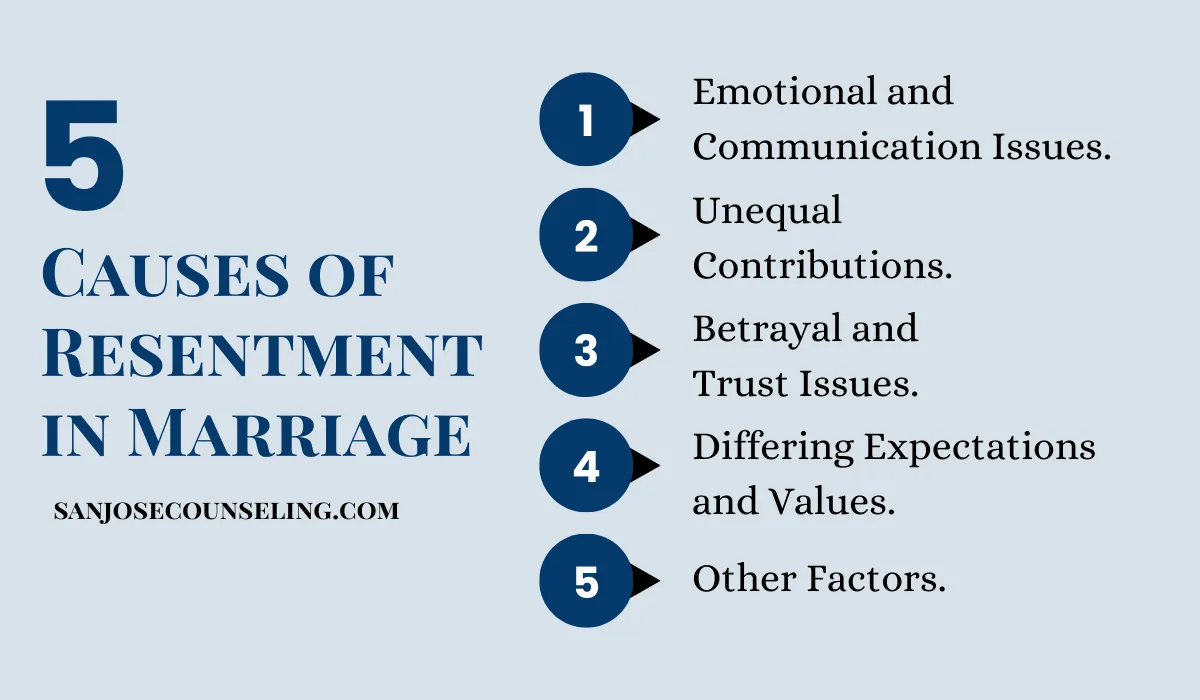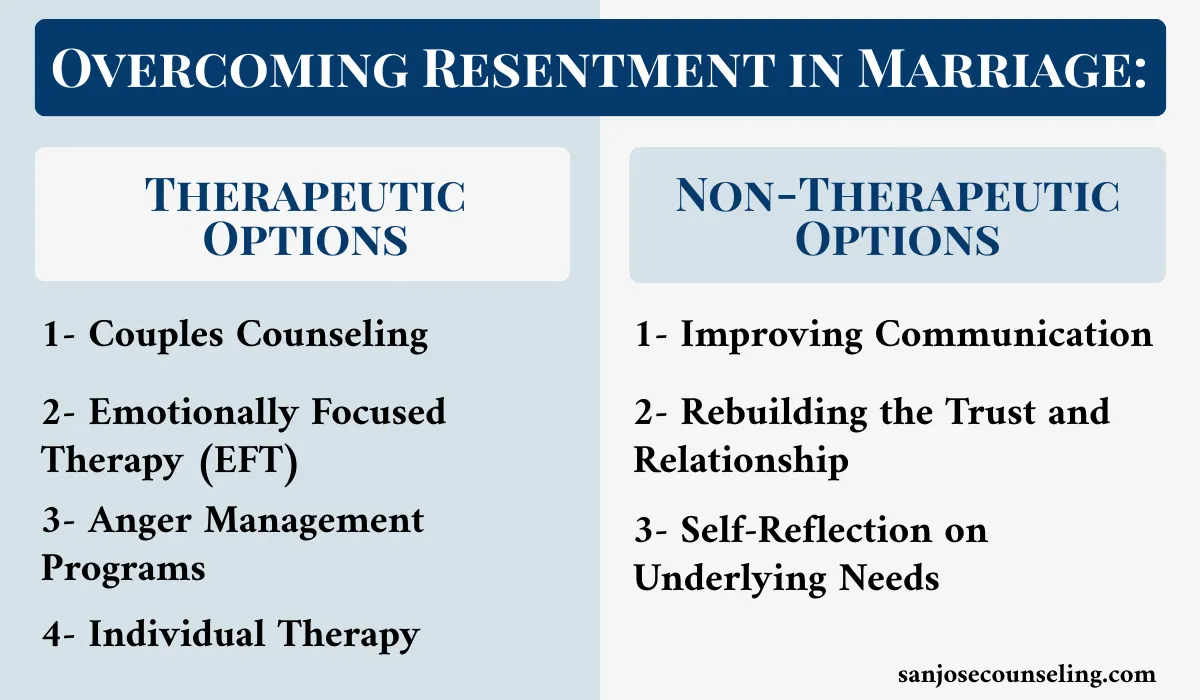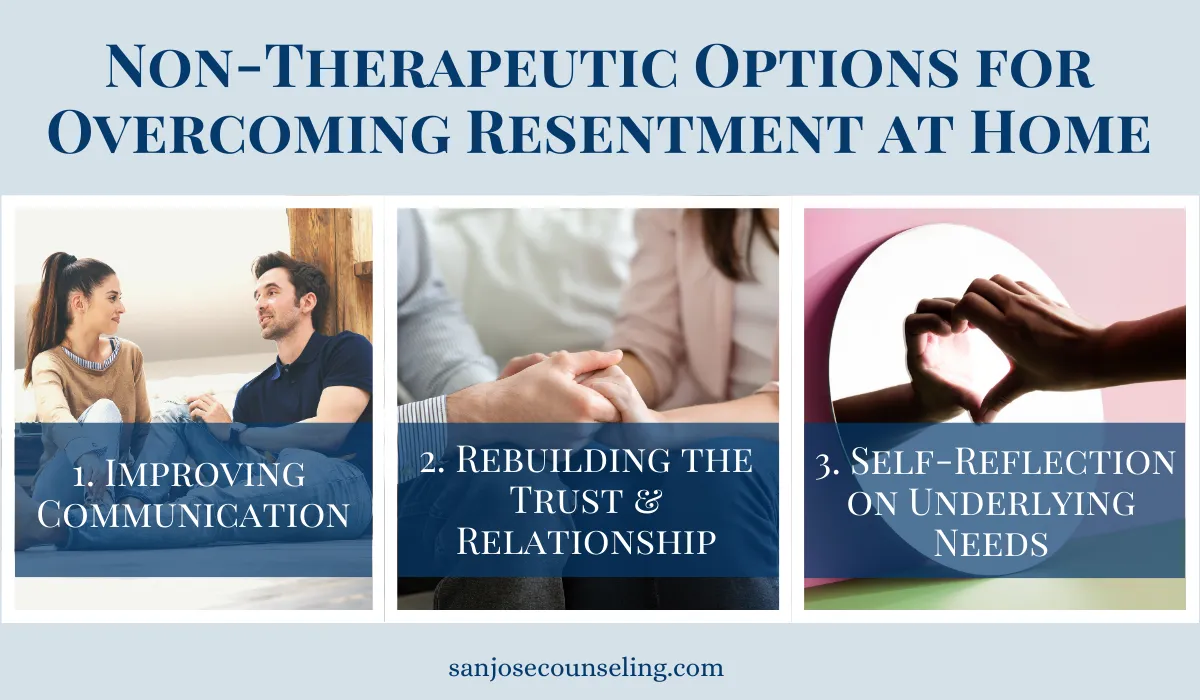Seek Therapy
408-920-1730
Overcome Resentment in Marriage with The Expert Tips from an LMFT Therapist.

Marriages can slowly turn sour. A few years ago, you were having happy moments together, now, everything they do annoys you. They either miss date nights, don’t take the trash out on time, or are always too tired.
This is resentment in marriage, and it doesn’t appear all of a sudden but slowly creeps into your union from one unresolved ick or issue. Over time, it becomes this thorn in your happiness, slowly destroying a once-cherished connection.
The good news is that you can fix this issue and restore excitement, romance, and understanding in your marriage. Get a FREE Consult with LMFT Therapist Dr. Invia Betjoseph today!
Understanding Resentment in Marriage and Relationships.
In simple words, marriage resentment is when you feel a lingering sense of bitterness for your spouse, mostly due to unresolved hurt, either factual or perceived.
You can tell you or your partner feel resentment in marriage when you encounter the following:
- Avoiding sexual intimacy
- Fantasizing about leaving
- Frequent sarcasm or eye-rolling
- Frequent criticism ("You always...")
- Always remembering past mistakes
- Feeling more like roommates than partners
- Emotional withdrawal or unexplained silence
Keep in mind that it’s totally normal to experience issues in marriage. However, failing to address and resolve these issues can lead to silent grudges, which later graduate to resentment that destroys your marriage.
Causes of Resentment in Marriage

A wife may develop resentment when her husband leaves all home chores with zero assistance, while a husband can feel the same when his wife shows no appreciation for provisions or sacrifices made.
The things that can cause resentment in marriage are many, but here are a few you might want to consider:
1. Emotional and Communication Issues
The first and most common reason married couples fall out of love is poor communication and bad emotional management. When one party feels manipulated, unheard, or even silenced, new wounds can form or old ones can even deepen.
Sometimes, this behavior isn’t deliberate. Some people instinctively avoid difficult conversations or shut down when upset. This stonewalling is often a defence mechanism from either previous trauma, fear of conflict (violence), or difficulty expressing themselves.
Other times, your resentment can be due to their personality, for example, narcissistic behavior. Sometimes, your partner could shower you with love and then the next moment, become cold. They could also be making unilateral decisions like suddenly spending joint savings.
Regardless of the reason or trait, failing to call out these issues will eventually cause resentment as the silent grudges grow to have physical and behavioural effects. In other words, action is your only tool in this mission of rebuilding love.
2. Unequal Contributions
When there’s injustice, resentment can grow. A wife giving her husband a lot of time, money, and even sacrificing career aspirations without the man returning the same energy can cause her to slowly despise the relationship.
While you don’t have to match each gesture, simple actions like equally dividing labor in the house, acknowledging sacrifices, and allowing the less financially powerful partner to make money-related decisions like where to travel for vacation can go a long way.
The goal is for both parties to feel values. Spouses are often happy making sacrifices and moving mountains for their partner. However, when their labor of love goes unnoticed, it can make the relationship feel less worthwhile.
3. Betrayal and Trust Issues
No one wants to be cheated on, even if it’s emotional cheating. Affairs and dishonesty can cause the other partner to lose faith in the relationship as they unconsciously anticipate another disappointment, which can steal joy away from the union.
However, it’s important to know that some feelings of betrayal are based on past trauma. For example, childhood abandonment or previous wrongdoings from an ex-lover can cause your significant other to overreact. This issue is why betrayal trauma therapy is important before marriage.
However, if you plan to rebuild trust in the relationship, the goal isn’t to forget what happened. The focus should be shifting to a place where safety, whether emotional or physical, is no longer a question. Even if you can’t promise the words, you can guarantee excellent communication to ease their nerves and prevent spiralling thoughts.
4. Differing Expectations and Values
Sometimes, you and your partner may have different views on things. This can include your thoughts on gender roles, children, religion, and lifestyle choices. The problem comes when you have expectations that differ from these values.
For example, you may slowly resent your atheist husband for teaching the children about evolution or not taking them to church. A more extreme scenario would be having a career wife that works daily, barely having time for Sunday family dinners or being at home regularly.
Failing to tackle this problem with effective communication and compromise can cause the marriage to slowly become toxic. However, finding a solution in this case can be tricky, which is why we recommend a skilled therapist to guide you two to a compromise that benefits everyone involved.
5. Other Factors
Like we previously said, resentment in marriage can be caused by a plethora of factors beyond the ones we mentioned. Some could include addictions, meddling family members (mother-in-laws, for example), or external crises.
External crises could be job loss or a chronic illness with no solution in sight. This can further put stress on minor cracks in your marriage, widening to bigger issues that eventually crumble the relationship.
Your best bet to fixing this tissue is therapy with an experienced professional like San Jose Counseling.
Overcoming Resentment in Marriage: Therapeutic & Non-Therapeutic Options for Californians

Hope isn't enough to eradicate resentment - it needs strategy from expert marriage counseling. Healing requires effort, whether that be in the form of a professional or a daily, active engagement in your recovery. Here's how you can decide on your next steps.
Therapeutic Options for Overcoming Marriage Resentment
Narcissism is a range, and there are subtle differences between overt and covert narcissism.
Professional help will produce breakthroughs that self-help won't provide. These four therapies are based on solid evidence that will help you address underlying resentment and other types of marital crises.
- Couples Counseling: When good communication shuts down, structured mediation can help. The therapists will help stop old, toxic patterns (the infamous "you always ...") and teach you steps to resolving conflict. This is best suited for partners who find themselves stuck in habitual, cyclical arguments, to the extent that they are willing to engage in therapy to improve.
- Emotionally Focused Therapy (EFT): A psychological approach that strengthens bond attachments and challenges partners to be vulnerable. Partners observe negative cycles ("I withdraw when you criticize"), and they learn to create new emotional experiences. This approach is best for couples who feel emotionally disconnected from each other.
- Anger Management Programs: A program specifically designed for couples whose resentment is volatile. Anger Management programs teach clients techniques to regulate their emotional rage when their resentment comes out as either a loud outburst or silent, withdrawn rage.
- Individual Therapy: This is best when one’s personal trauma is causing marital strife. There can also be childhood wounds from their own background, or a narcissistic personality style (Narcissism Therapy), or undisclosed mental health issues that are causing the marital relationship to be chronically poisoned.
Choose based on your specific resentment language - are you yelling and screaming, withdrawing, or rehashing old wounds? Book a FREE Consult with Dr. Invia– California’s Top-Rated Licensed Marriage and Family Therapist.
Non-Therapeutic Options for Overcoming Resentment at Home

Not all resentment requires therapy—but all of it requires work. And, therapy has to include actual changes that you initiate in your daily life. These home-based strategies will help you reconnect when both partners are committed to change, starting today.
1. Improving Communication
Master these four communication daily practices for couples:
- Gratitude Exchange: "I appreciated when you..." (specifics matter)
- Trigger Tracking: Journal heated moments to spot recurring themes
- Letting Go Rituals: Physically release resentments (burn/tear written notes)
- Active Listening: Paraphrase their words ("You're saying you feel alone in this")
2. Rebuilding the Trust and Relationship
Use this trust-building plan to overcome resentment in your relationships:
- Verbal Validation: "I appreciate that my tardiness made you feel unworthy."
- Micro-Promises: Text if you are running 15+ minutes late (and keep that promise)
- Protected Time: Weekly device-free walks or coffee mornings
- Chart Reset: This time, make a chore wheel together, showing visible equity.
Pro tip: Start with option #2 - small wins attached to credibility help create momentum for larger repairs.
3. Self-Reflection on Underlying Needs
Cut through resentment with these questions:
- Surface or Root: "Is this issue about dirty socks or respect?"
- Past Patterns: "Is the criticism similar to what I grew up with from my father?"
- Core Needs: "What do I put above him more? Independence or being together?"
- Naming: "Did I communicate this need?"
If the issue still lingers after a discussion, then perhaps you haven’t found the real problem.
Concluding Thoughts
Resentment lives in silence and dies with action. So pick one small action to do today: either text your partner about one moment you appreciate or journal out your resentment and reflect on why you still feel it.
If your resentment is deeper, professional and compassionate counseling may be what you need. It helps you better make sense of the situation, offers a plan, and guides you through the execution.
You can restore the lost happiness in your marriage, and you don’t have to do it alone. Start that journey. Schedule a FREE Consult with our expert marriage counselors and therapists on San Jose Counseling!


